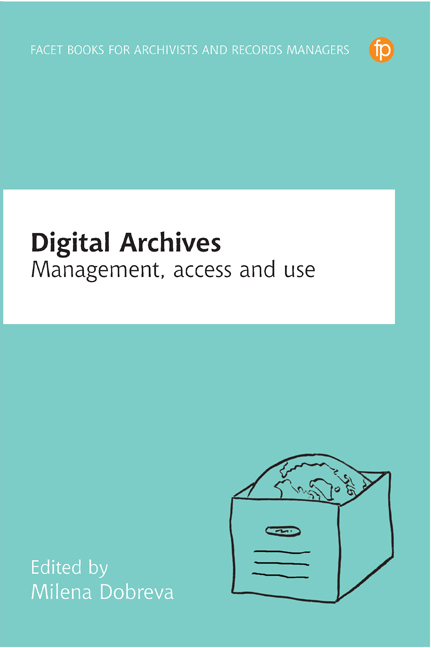Book contents
- Frontmatter
- Dedication
- Contents
- List of Figures and Tables
- Abbreviations
- Foreword
- Preface: Digital archives: management, use and access participatory approaches in archives
- Acknowledgements
- Notes on contributors
- PART I DRIVERS FOR MODERN DIGITAL ARCHIVES
- 1 Digital humanities and documentary mediations in the digital age
- 2 Managing turbulence
- 3 The political economy of digital cultural preservation
- 4 Legal issues surrounding digital archiving
- 5 Scientific information policies in the European context
- 6 Access to digital archives: studying users' expectations and behaviours
- PART II CASE STUDIES
- Afterword
- Index
6 - Access to digital archives: studying users' expectations and behaviours
from PART I - DRIVERS FOR MODERN DIGITAL ARCHIVES
Published online by Cambridge University Press: 02 October 2019
- Frontmatter
- Dedication
- Contents
- List of Figures and Tables
- Abbreviations
- Foreword
- Preface: Digital archives: management, use and access participatory approaches in archives
- Acknowledgements
- Notes on contributors
- PART I DRIVERS FOR MODERN DIGITAL ARCHIVES
- 1 Digital humanities and documentary mediations in the digital age
- 2 Managing turbulence
- 3 The political economy of digital cultural preservation
- 4 Legal issues surrounding digital archiving
- 5 Scientific information policies in the European context
- 6 Access to digital archives: studying users' expectations and behaviours
- PART II CASE STUDIES
- Afterword
- Index
Summary
Archivists have traditionally dedicated little time and attention to studying their users; archivists focus, first and foremost, on the care and preservation of records, and only secondarily on records’ use.
(Duff, 2012, 199)Users, archivists and their interaction
Almost 20 years ago the famous Canadian archivist Barbara Craig gave the title ‘Old Myths in New Clothes: expectations of archives users’ to her contribution to a conference on archives’ public (Craig, 1998). She provided evidence that there is a risk that archives are ‘condemned by their own methods to fall short in meeting the needs of their users’; she also argued that this is not a new issue, but ‘an updated version of the familiar scenario in which it is assumed that conflicting demands and distinctions exist between select services for an elite clientele and popular appeal and services for the many’. The popular myth that the world wide web contains every possible information enforces the misconceptions about the nature of users and their access behaviours, so ‘it is crucial that the energy behind our concern not dissipate in complaining’, but archivists should accept that ‘the many varieties of myth surrounding information technology contain a core of reality for users and for archives’.
Users follow different strategies
The development of digital environments for offering access to archival information requires considering different scenarios of use. The popular typology of internet users includes two categories – browsers (or surfers) and searchers, where the browser typically follows multiple links mostly for amusement, and the searcher is seeking specific information. Actually back in 1977 when discussing the wider case of information retrieval, Carl Beck introduced three categories, browsers, searchers and reductionists (Beck, 1977).
Carl Beck summarised their strategies and we are providing his description here because it is insightful about not only users’ interactions with digital material, but also the long way digital collections have developed over 40 years.
A browser is typically a person who wants to be brought up to date on some specific field or subfield. Browsers are interested in all the information that meet their criteria. They are not particularly concerned with the preciseness of the fit of the material retrieved to their search strategy. They tend to evaluate a system on its comprehensiveness and judge a system on its ability to recall.
- Type
- Chapter
- Information
- Digital ArchivesManagement, use and access, pp. 121 - 136Publisher: FacetPrint publication year: 2018
- 1
- Cited by



